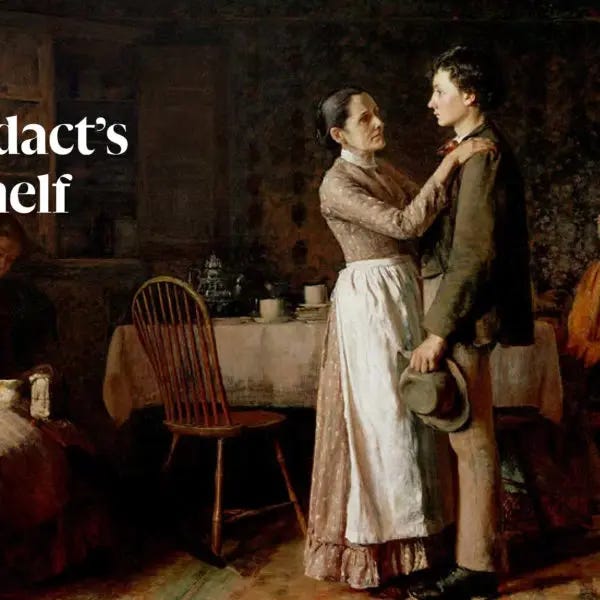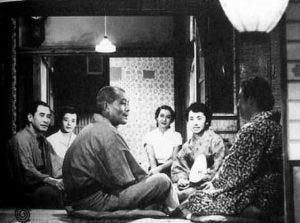Our Callousness Toward the Ones We Love Most
As we get older, it’s natural to grow apart from our parents. But is it a sign that something deeper is wrong with our society?
By James Broughel
The most natural bond that exists between human beings is that of parent and child. Most of us are raised by our parents and spend nearly the first two decades of our lives in their constant presence. We come to resemble them physically, as well as their personality and character.
It is odd then that so many children grow so distant from their parents as they age. And yet this happens so routinely it could perhaps be considered as natural as aging itself. By our adult years, very often our friends, and of course our spouses and romantic partners, offer greater emotional comfort to us. Meanwhile, for many of us, the formality that arises between ourselves and our parents is so great it comes to almost resemble a business relationship.
A large number of literary and artistic works wrestle with this issue of emotional drift from one’s parents. One of the most compelling of these treatments is the 1950s Japanese film “Tokyo Story,” directed by Yasujirō Ozu. The movie follows an elderly couple named Shukichi and Tomi as they travel from their rural village to Tokyo to visit their grown children. The trip ends up a disappointment, as it reveals to them the disconnect between the generations in their family. Indeed, their dead son’s widow treats them more hospitably than their own flesh and blood, who are too busy to devote them much time or attention.
Generational Disconnect. A scene from 1953's Tokyo Story. Image Credit: Wikimedia Commons
Tragically, Tomi, the mother, dies of illness, and after a short visit to the countryside to be by her side during her passing, the children waste no time dividing up her clothes before heading back to their lives in the city. Their behavior highlights how transactional their relationship with their parents has become. It is troubling, yet hardly surprising when we think about how many children fight over inheritances in our own time and culture.
The hustle and bustle of daily life—including from raising children of one’s own—tends to reach a peak for many people in their 30s and 40s and leaves little time for much else. In this way, as Harry Chapin and other songwriters have chronicled, an emotional progression away from one’s parents is probably inevitable.
Yet while there is a degree of normalcy to separation as children strike out on their own, it can quickly grow into something deeper and more unsettling.
In “The Stranger,” published in 1942 by the French author Albert Camus, the central character Meursault is an apathetic Frenchman living in Algiers. The book’s opening lines are “Mother died today. Or, maybe, yesterday; I can't be sure,” and they highlight immediately Meursault’s indifference toward his own mother’s death.
His apathy eventually gets him into trouble. Meursault and a friend named Raymond get into a row with some local street thugs. What starts out as a petty dispute ends up with Meursault killing a man. But while he considers the act a clear case of self-defense, the prosecutor sees things differently, especially after learning of Meursault’s callous behavior at his mother’s funeral. He labels Meursault “the antichrist” for his cool detachment from all those around him.
Even Marie, Meursault’s love interest, does little to spark his emotions. When she asks if he loves her, he narrates coldly that he doesn’t believe so, and when she asks if he wants to marry her, he states it makes no difference to him. He even agrees to marry her in spite of not loving her, signaling a startling lack of concern about the direction his life is taking.
Meursault’s absurdist perspective on the world is captured neatly in a newspaper clipping he comes across while in jail. It details the story of a Czechoslovakian man who, after having been away for many years, returns home and visits an inn managed by his mother and sister. Now successful, he spends lavishly in their presence. But they don’t recognize him and he doesn’t reveal his identify, as he means to surprise them. However, his flamboyant spending gives his mother and sister the idea to murder him in order to steal his money. When the truth is revealed after the fact, they both commit suicide.
Sometimes the gulf that arises between parent and child comes not in the form of feeling like strangers, but rather as a fiery feud. In Dostoevsky’s “The Brothers Karamazov,” father and son Fyodor and Dmitri are both infatuated with the same woman, the beautiful Grushenka. They compete for her affections, as well as over Dmitri’s inheritance. When Fyodor is murdered, Dmitri becomes the prime suspect and is put on trial for the crime.
To be sure, the disinterest of Meursault and the passionate fury of Dmitri are extreme cases. Most often, parents and children simply grow apart from one another over time. The real exceptional cases are those where children maintain a tight-knit bond with their parents into adulthood.
What’s striking about this state of affairs is how different it is from the way the world once worked. Children used to take care of their parents, largely because families lived together or at least lived close to one another. This is often no longer practical as children move away for schooling or career opportunities.
Modern capitalist society is undoubtedly less communal and more individualistic than cultures in the past, and so the state has stepped in to take over this role as caretaker. That may be a good thing from the standpoint of economic growth, but it probably stands in the way of making and maintaining meaningful connections toward the end of one’s life.
This should lead us to wonder whether it has to be this way. If it doesn’t, which human frailties might explain our failure to fulfill our obligations to our parents? Might we be too busy, like the children of Shukichi and Tomi? Are we simply indifferent like Meursault? Or perhaps are we competitive with our parents and out to prove something, like Dmitri?
Whatever the reason, the bond that exists in childhood often frays to the point where parent and child have little connection to each other. That seems like an indictment of our society, and yet outrage about it is almost nowhere to be found.



